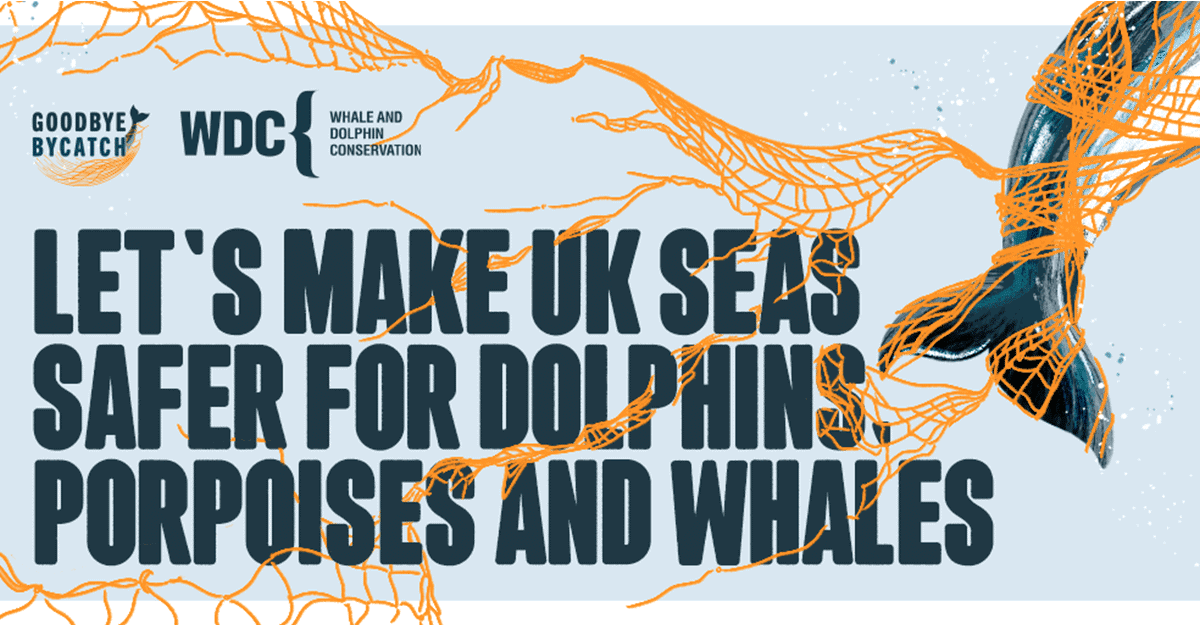#GoodbyeBycatch: Making UK seas safer for dolphins, porpoises and whales

Every year, over a thousand whales, dolphins, and porpoises are dying in UK seas – a shocking by-product of putting fish and shellfish on our plates. Not only is this number unacceptable, it’s also avoidable.
We have been working with Whale and Dolphin Conservation (WDC) to develop their #GoodbyeBycatch campaign, which calls on the UK government to adopt meaningful policy to combat bycatch.
What is bycatch?
‘Bycatch’ is the term used to describe marine creatures that become trapped by commercial fishing nets deployed to catch other species. In the case of whales, dolphins and porpoises, getting tangled in fishing nets or creel lines often proves fatal. It’s a slow, painful and undignified death: these creatures frequently find themselves weighed down by equipment, meaning they are unable to reach the surface for air, leading to eventual suffocation.
Every year in UK seas alone, bycatch kills around 1,000 porpoises and 250 common dolphins in gill nets (nets that hang vertically in the water, catching anything that swims into them), and around 30 minke whales and 5 humpback whales in creel lines (the ropes that join together the baskets used to catch shellfish). It’s an untenable situation, and one that WDC are hoping to change.
It’s time to say #GoodbyeBycatch
When it comes to implementing changes within commercial fishing, now is a pivotal time. The UK’s exit from the EU has paved the way for a new Fisheries Act, and in turn the opportunity to adopt policy that works to protect dolphins, porpoises and whales from fishing gear and make the seas around the UK safer.
That’s why WDC have launched their #GoodbyeBycatch campaign. They want to encourage the public to lobby the UK and devolved governments to adopt specific measures to reduce bycatch in UK waters.
🌊 More than 1,000 dolphins, porpoises and whales die in UK seas every year – but it doesn’t have to be this way. The fishing industry doesn’t want this to happen, and there are solutions.
🐋 Join us in saying #GoodbyeBycatch.
🐬 Visit https://t.co/Dwse5wyNoU to learn more. pic.twitter.com/iryrYZPeDq— Whale and Dolphin Conservation (WDC) (@whalesorg) February 18, 2021
What are the solutions?
It’s important to note that no one wants to catch a dolphin, porpoise or whale, and it’s vital that the fishing industry has the support of governments when it comes to reducing bycatch numbers. Luckily there are practical, policy-based solutions that could dramatically reduce the numbers of whales, porpoises and dolphins caught in fishing equipment in UK seas. These include:
- Managing fisheries to measurably and continually reduce bycatch over the next 5 years.
- Replacing gill nets, which cause the most deaths, with safer alternative gears. (Those with the highest levels of bycatch should be replaced by 2026.)
- Investing in new bycatch prevention technologies.
- Developing mitigation plans for trawl fisheries that may pose a risk, such as ‘moving on’ when dolphins are encountered.
- Scaling up independent bycatch monitoring on fishing vessels (including the use of cameras on vessels).
- Working with and supporting fishers to make these changes.
- Applying the appropriate standards to all fishing vessels in UK seas.
What can you do?
In the run-up to the release of the Joint Fisheries Statement in 2022, we all have the power to affect change by lobbying the UK and devolved governments to commit to implementing the solutions outlined above.
If you’d like to help make bycatch a thing of the past, visit WDC’s campaign page, where you can use their simple tool to email your Fisheries Minister asking them to take action on bycatch.
You can also raise awareness of bycatch by sharing the campaign on social media. Watch the campaign video (voiced by Sir Mark Rylance) below, and visit the social media toolkit for post templates and links to further assets. The campaign has already had shares from Mya-Rose Craig (Birdgirl), Hugh Fearnley-Whittingstall and Dr Amir Khan.
With more robust policy, we can say #GoodbyeBycatch, and make UK seas safer for dolphins, porpoises and whales. Will you join us?


